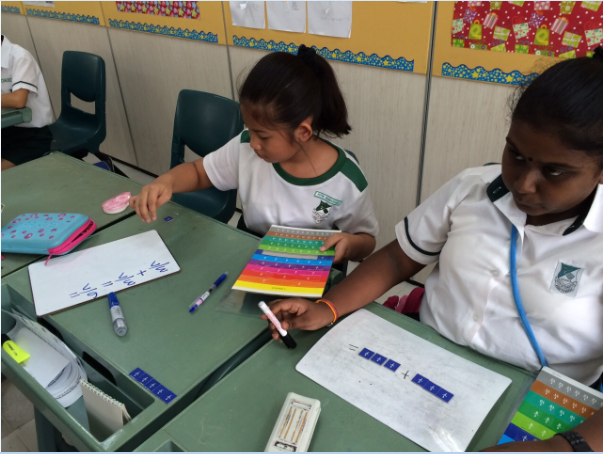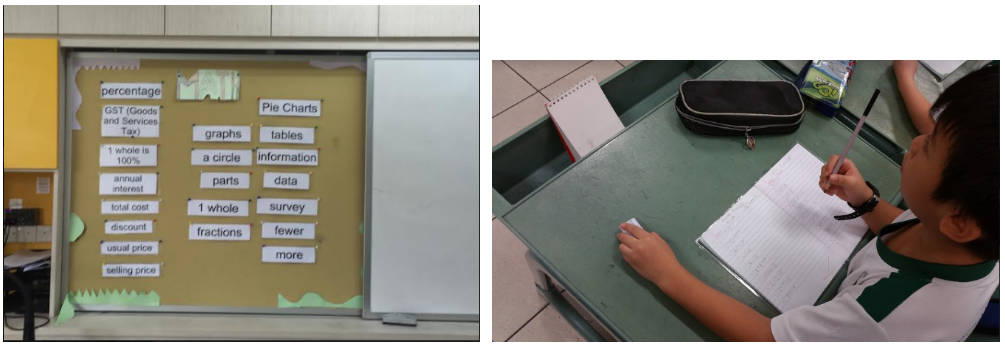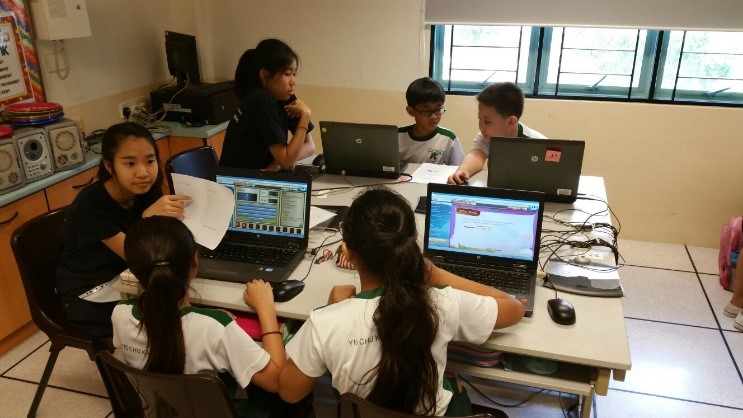Key Programmes and Activities
Making Thinking Visible in Mathematics
Making Thinking Visible (MTV) in the Mathematics Classroom through the use of the Concrete-Pictorial-Abstract (CPA) Approach and Whole-School Approach to Effective Communication (WSA-EC) which require students to verbalise their thought processes through the accurate use of Mathematical terms and understanding from tactile experience to application of abstract concepts so as to learn for understanding. It is also realised through the use of Polya’s Approach which is also introduced as UP-Do Check in the school. Through this approach, students are taught how to annotate for understanding, represent their understanding pictorially and apply a specific heuristic skill to solve a mathematical problem.

Mathematical Manipulatives for tactile experience
Display understanding through the use of mathematical language by thinking aloud and the using of a mathematical manipulative

Whole-school Approach to Effective Communication (WSA-EC) in Mathematics
Whole-school Approach to Effective Communication (WSA-EC) in Mathematics is used to engage students in constructive talk through the use of mathematical language. Some platforms such as explaining thinking process and solutions through the use of C-P-A Approach, Polya’s Approach, answering questions posed by teachers to check for understanding, the immersion of Math words displayed on word wall and the use of Mathematics Journaling are used to encourage effective communication in Mathematics.

Learn Through Play and Character and Citizenship Education (CCE) in Mathematics
Students get to engage in Mathematics Games Play such as Number Rumble, Blokus, Number Rumble (New Version) as well as through Math Games Apps in i-pads at least once a term per level. Through play, Mathematics teachers hope to inculcate the value of care and respect through fair play as well as agreeing to disagree. Explicit teaching of values during play allows students to realise the importance of displaying values in Mathematics.

Heuristic Skills in a Spiral Approach through Multiple Approaches in Maths Problem Solving (MAPS)
Students are taught and exposed to various heuristic skills such as Model Drawing, Work Backwards, Look for a Pattern, Make a Systematic List, Make a supposition etc.
One of the heuristic skills is listed in a spiral approach in the table shown below.
| Model Drawing | ||||
|---|---|---|---|---|
| Primary 2 | Primary 3 | Primary 4 | Primary 5 | Primary 6 |
| Unitary Method | Part-whole Comparison | Part-whole comparison Stacking |
Part-whole comparison Stacking Constant Difference |
Part-whole comparison Stacking Constant Difference Before & After |
Other Key Programmes
Peer Tutoring Programme for P3 and P4 pupils -in collaboration with Hougang Secondary Pupils
Selected P3 and P4 pupils participated in the peer tutoring programme that carried through for 10 one-hour sessions. The peer tutors from Hougang Secondary School are mostly Secondary 1 and 2 student leaders. The objective of the programme is to build up Mathematical concepts and coach our pupils on remediation. From these peer interactions, our pupils are more confident and motivated in the learning of Mathematics.

Model Drawing Modules
In our school, all pupils from Primary one to Primary six are introduced to Model Drawing, a useful heuristic skill in solving word problems. Pupils are taught to use rectangular bars to model word problems. These models help students visualize abstract math relationships through pictorial representations. Through the models, pupils are able to communicate their thinking when solving complex word problems.
MAPS (Mathematical Approaches in Problem Solving)
Besides the Model Drawing modules, all pupils from Primary one to Primary six are introduced to other heuristics such as Guess-and-Check, Draw a Diagram, Work Backwards, Make a Systematic List and Simplify a Problem.
Number Rumble Challenge
The Number Rumble is a Mathematical number game designed to allow pupils to learn Math in a fun and educational way. It hopes to stimulate the interest of pupils in the learning of Math as well. The game will be held once in every term for all the classes. For each term, three winners will be identified and at the end of the year, there will be a Level Challenge where the best of all the classes will come together and compete with one another. Three level winners will subsequently be singled out and each will obtain a medal.



